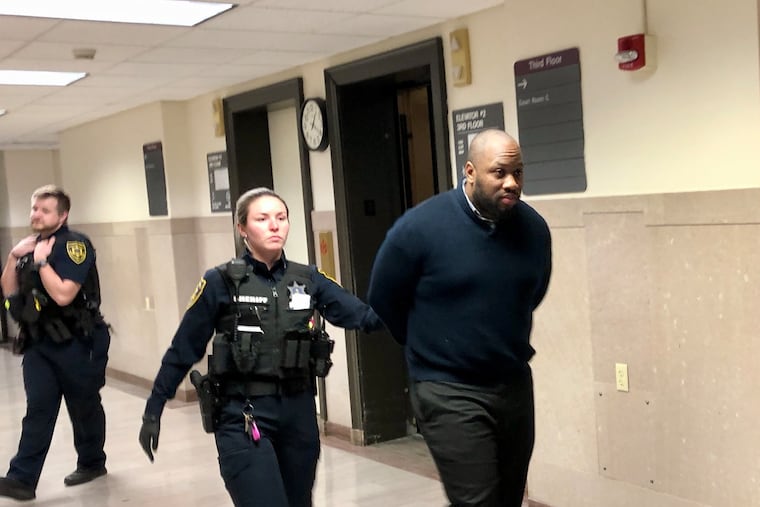A Limerick man on trial for his business partner’s murder denied hurting her: ‘I don’t know anything.’
In two recorded police interviews, Blair Watts said he would never harm Jennifer Brown. However, Watts became frustrated and emotional when confronted with inconsistencies in his story.

A Limerick man on trial for killing his business partner and burying her in a shallow grave vehemently denied harming her during two recorded police interviews played in court Friday.
“I don’t have the information you want me to give,” Blair Watts said in an interview Jan. 7, four days after Jennifer Brown, 43, was last seen. “I can’t explain what happened. ... I don’t know anything.”
But Montgomery County prosecutors say there is clear evidence against Watts, 33, implicating him in Brown’s death: His red Jeep Grand Cherokee was seen outside of the warehouse where Brown’s strangled body was found two weeks after she disappeared. A cadaver dog found traces of a corpse in that Jeep as well as inside Watts’ wife’s Jeep Renegade.
Watts’ attorney, Michael Coard, pointed out that the businessman went to the police on his own, and agreed to have his vehicle searched. He said detectives were relying on circumstantial evidence and questioning Watts based on mere suspicions.
During his two interviews with Montgomery County Det. John Wittenberger, Watts gets frustrated and emotional when confronted with inconsistencies in his story, including his assertion that he did not have the Jeep Grand Cherokee he was later seen driving.
Still, he insisted that he would never harm Brown.
Instead, Watts seemed to implicate Brown’s neighbor, a man police say she had been romantically involved with for two years. Watts told Wittenberger the man was “aggressive” and said he believed he was jealous of Watts’ relationship with Brown.
Investigators ruled that man out as a suspect after confirming his alibi through cell phone records and searches of his home and car, according to testimony Friday.
Watts said he and Brown had known each other for about two years after meeting as neighbors in an apartment complex in the area. Their friendship soon became a financial partnership, when Brown invested thousands of dollars into Watts’ restaurant, Birdie’s Kitchen.
Watts told police he expected the business to reopen in late January. But prosecutors say he was lying: Days before Brown’s disappearance, his lease was revoked over a lack of payment.
The last time Watts saw Brown, he said, was about 2 p.m. on Jan. 3, when the two had an “airing of grievances” at her house to discuss stresses in their lives. She confided in him, he said, about how unhappy she was at her current job, and how difficult it was to be raising a son as a single mom.
“She was depressed all the time; something wasn’t good there,” Watts said. “So I told her ‘I can’t help you with none of that [expletive] but I can help you with Noah.”
He offered to take the 8-year-old overnight for a sleepover at his home with his three kids. But prosecutors noted that Noah did not have a change of clothes or his needed medication. They said Watts and Brown had exchanged detailed text messages about logistics during previous sleepovers in 2022. But this time, they said, the two were not in contact before or during the Jan. 3 sleepover.
Watts’ wife, Tyerra Taylor, testified Thursday that she was not expecting the boy that evening. Taylor, who works a night job, said she asked Watts whether he would be home to watch Noah and their three children.
She said he told her he was going out to dinner and would return later that night. He never did, she said, and the children were left alone for hours.
Tatianna Garrett, a woman Watts had started dating while previously separated from his wife, told jurors that he left his home to spend the night with her. The next morning, she said, Watts told her not to tell police about the Jeep Grand Cherokee he had driven to her apartment that evening.
In his conversations with Wittenberger, Watts denied that. Toward the end of that interview, Wittenberger asked if Watts considered Brown a friend.
“We all did,” he said in response.
Wittenberger pointed out that he used the past tense to refer to Brown, who was still missing at the time and whose body had not yet been discovered.
The trial is scheduled to continue next week.